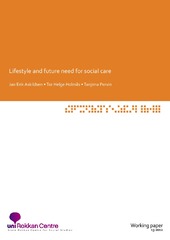| dc.contributor.author | Askildsen, Jan Erik | eng |
| dc.contributor.author | Holmås, Tor Helge | eng |
| dc.contributor.author | Pervin, Tanjima | eng |
| dc.date.accessioned | 2014-02-26T10:15:14Z | |
| dc.date.accessioned | 2020-12-10T06:31:46Z | |
| dc.date.available | 2014-02-26T10:15:14Z | |
| dc.date.available | 2020-12-10T06:31:46Z | |
| dc.date.issued | 2012-12 | eng |
| dc.identifier.issn | 1503-0946 | |
| dc.identifier.uri | https://hdl.handle.net/1956/7831 | |
| dc.description.abstract | Early-age lifestyle may be an important predictor of demand for social care later in life. Using a longitudinal dataset, in this paper we analyse the effects of previous lifestyle choices on the need for social care. Physical exercise, smoking, alcohol consumption and body mass index are measured in 1986, and a proxy for the need for social care, ADL score, is measured in 2006 for individuals aged 70 or above. Results are estimated by a flexible finite mixture model that splits the population into two groups depending on need. Findings suggest that smoking behaviour and obesity are significantly and positively associated with future need for social care, whereas doing exercise has a negative influence. However, we do not find any significant and consistent result for different levels of alcohol consumption. The results differ by gender. The findings have important policy implications for countries with an ageing population. | en_US |
| dc.language.iso | eng | eng |
| dc.publisher | Stein Rokkan Centre for Social Studies | eng |
| dc.relation.ispartofseries | Working paper 13/2012 | eng |
| dc.subject | social care | eng |
| dc.subject | Lifestyle | eng |
| dc.subject | Ageing | eng |
| dc.subject | count data models | eng |
| dc.subject | finite mixture model | eng |
| dc.title | Lifestyle and future need for social care | eng |
| dc.type | Working paper | eng |
| dc.rights.holder | Copyright the authors. All rights reserved | |
| dc.subject.nsi | VDP::Samfunnsvitenskap: 200 | nob |
